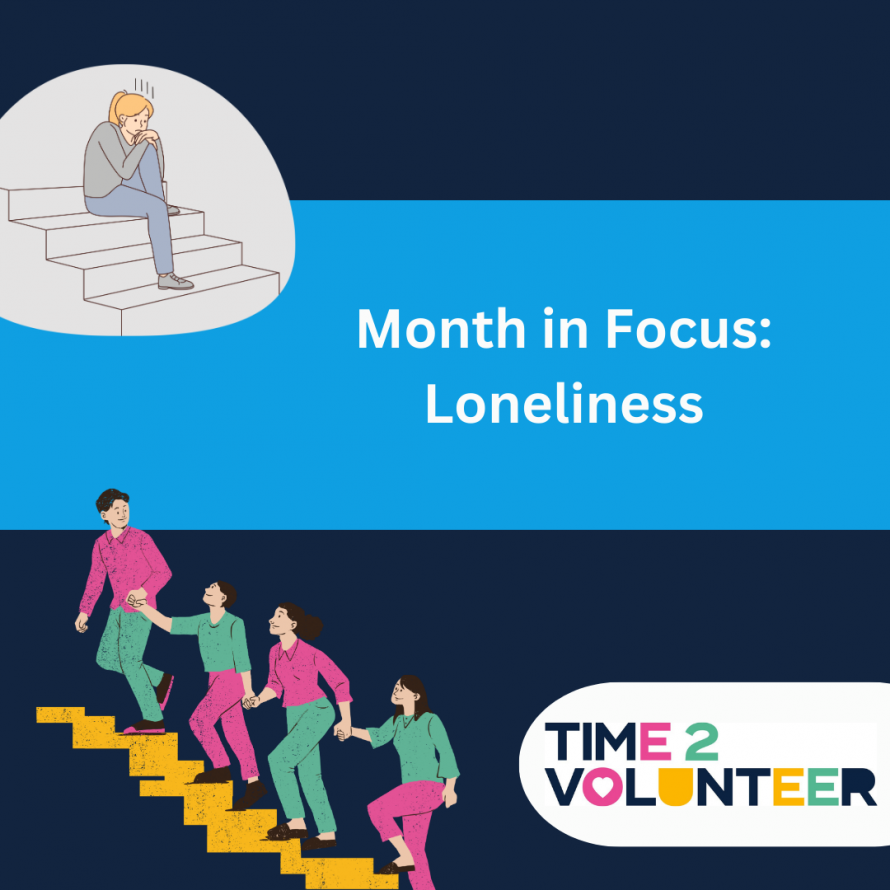As part of our Time2Volunteer Month in Focus in November, we will showcasing various event and activities that Voluntary, Community and Social Enterprise (VCSE) groups with the support of volunteers undertake to help people to overcome loneliness.
Read on to find out more about loneliness and why volunteers are so important to tackling the wicked issue.
What is loneliness?
Loneliness is ‘a subjective, unwelcome feeling of lack or loss of companionship. It happens when there is a mismatch between the quantity and quality of the social relationships that we have, and those that we want’ (A connected Society: A Strategy for Tackling Loneliness 2018).
Who can be affected by loneliness?
Loneliness can affect everyone and can range from transient (comes and goes) to chronic loneliness that can have a long term impact on physical and mental health.
But who is most affected?
According to the UK Government’s Talking Loneliness Strategy review, loneliness is higher for people who are:
• 16-24 years old
• Females
• Single or widowed
• Living with life limiting mental health conditions
• Renting
What factors can increase loneliness?
• Personal characteristics - age (younger or older), marginalised ethnicity, sexuality or disability.
• Circumstance – living alone.
• Going through significant change – migration, becoming a carer, bereavement, a new baby, moving house or job, children leaving to university.
• Living in a certain area – social-economically disadvantaged communities.
What is the effect of loneliness?
The impact can be huge but a few stats include:
• Loneliness can increase the risk of early mortality by 26%.
• Loneliness can put people at greater risk of poorer mental health, including depression.
• 62% of lonely young people say that ‘feeling lonely makes them lose confidence in themselves’. While loneliness in early adolescence is associated with lower educational attainment.
• Higher loneliness levels among employees is associated with poorer work performance and it is estimated that loneliness costs UK employers £2.5 billion a year, due to its impact on employee sickness, caring activity, productivity, and voluntary staff turnover.

How do VCSE organisations address loneliness?
The role of the VCSE in addressing and responding to loneliness is huge. There workers are often trusted by people and therefore are a port of call to share issues that individuals have.
The services designed to tackle loneliness include:
• Befriending schemes – these can be face to face or over the telephone.
• Buddies/companion roles.
• Activities and events that bringing people together.
All of which are primarily delivered with the support of amazing volunteers!
Who currently has volunteer opportunities addressing loneliness?
• Age UK Hull
• Hull CVS
• Alzheimer's Society
• Sight Support HEY
• Neighbourhood Network
• Refresh
• HU4 Community Hub
• Fitmums and Friends
• MHA Communities
• KIDS
• Hull Independent Visitors Project
• Hull Churches Home from Hospital
If you think you could be an amazing as a volunteer tackling loneliness, search for all local opportunities here:
Activity Facilitation Opportunities
To find out more about what being involved in these roles is like, read a case study:
Home Visit Befriender at Age UK Hull
Activity Support at Sight Support's SocialEyes